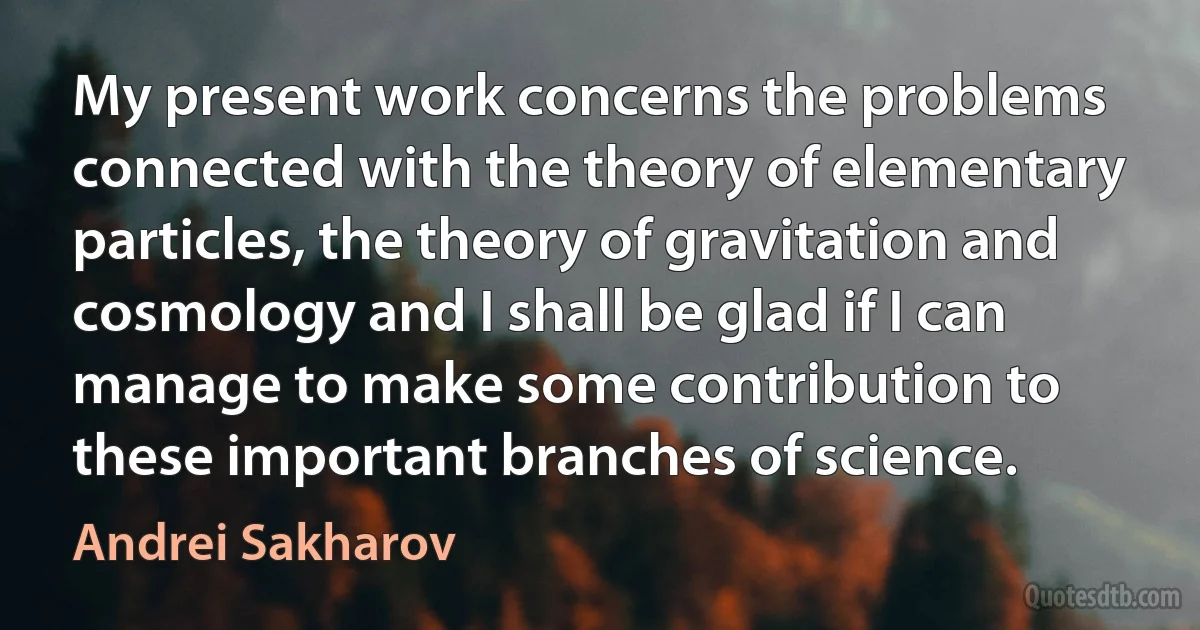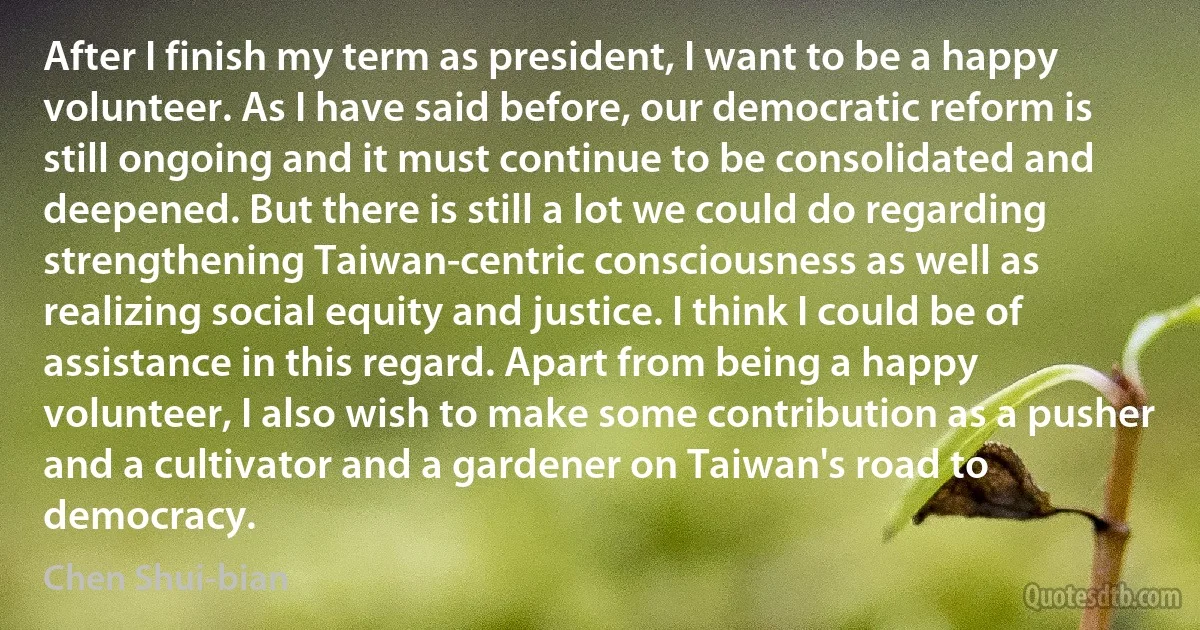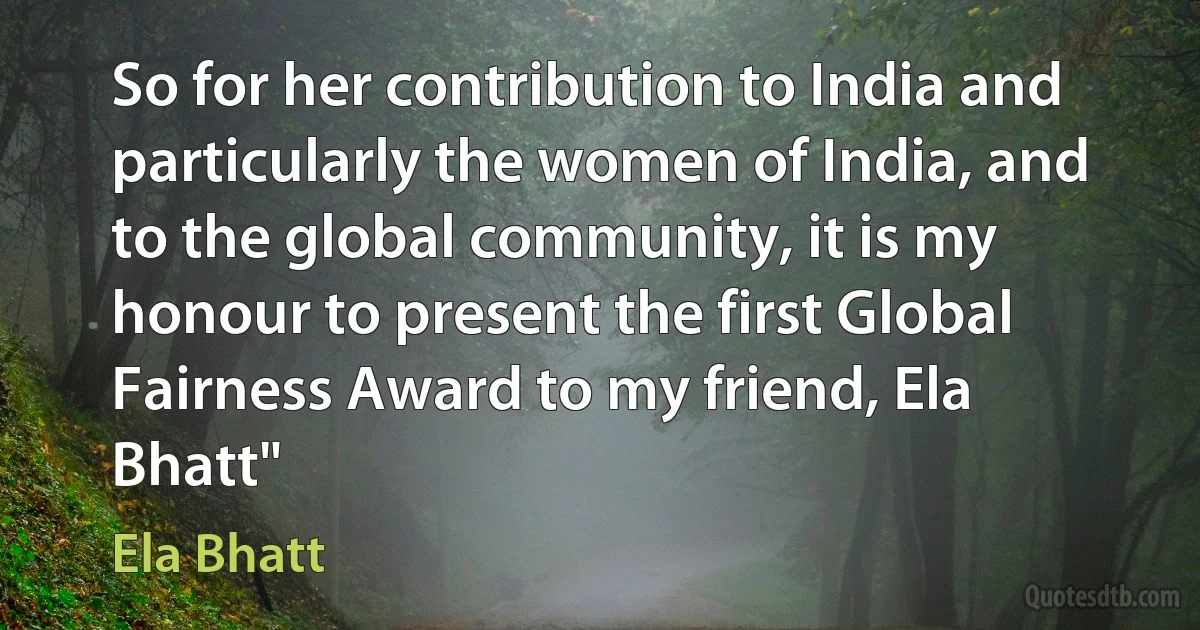Contribution Quotes - page 19
If Religion consist in voluntary acts of individuals, singly, or voluntarily associated, and it be proper that public functionaries, as well as their Constituents shd discharge their religious duties, let them like their Constituents, do so at their own expence. How small a contribution from each member of Congs wd suffice for the purpose? How just wd it be in its principle? How noble in its exemplary sacrifice to the genius of the Constitution; and the divine right of conscience? Why should the expence of a religious worship be allowed for the Legislature, be paid by the public, more than that for the Ex. or Judiciary branch of the Govt [?] Were the establishment to be tried by its fruits, are not the daily devotions conducted by these legal Ecclesiastics, already degenerating into a scanty attendance, and a tiresome formality?

James Madison
The Swiss-born psychiatrist Elisabeth Kubler-Ross changed western cultural resistance to dealing with death, and the teaching of how to accept it... Kubler-Ross's best known contribution to the study, thanatology, that she had helped to create, was the five stages of dying people go through. She described them - denial, anger, bargaining, depression and acceptance - in her bestseller On Death And Dying (1969), written in two months. Not everyone experiences all five, she cautioned, but at least two are always present. The definition, reached after scores of interviews with people facing imminent death, helped the medical profession to deal with a factor it had long refused to acknowledge, especially in the US... She wrote more than 20 books.. A firm believer in a god and the life hereafter, she became fascinated with near-death experiences and an advocate for people's stories of seeing a shining light and familiar faces, before being brought back from the brink.

Elisabeth Kübler-Ross
Altruism is an instinct we've inherited from the small society where we knew for whom we work, whom we serve. When you pass from this, as I like to call it, 'concrete society', where we are guided by what we see, to the abstract society which far transcends our range of vision, it becomes necessary that we are guided not by the knowledge of the effect of what we do, but by some abstract symbols. Now, the only symbol which tells us where we can make the best contribution is profit. And in fact by pursuing profit, we are as altruistic as we can possibly be, because we extend our concern to people who are beyond our range of personal conception. This is a condition which makes it possible to produce what I call an extended order, an order which is not determined by our aim, by our knowing what are the most urgent needs, but by an impersonal mechanism which by a system of communication puts a label on certain things which is fully impersonal.

Friedrich Hayek
The most secure nation in the whole of Europe, until it roused suspicions and fears against itself, was Germany. The German people who believe stories of encirclement cannot help recognising that their latest policy of military expansion, together with the circumstances of its declaration-an army greater than that of any other nation in Europe, an air force already declared equal to ours, a fleet that would be equal to the French and superior to the Italian-must rouse fear and unsettlement in the mind of every nation at which it can strike, and inevitably force the sound pacific idea of general collective security into the dangerous form of military alliances. The nations which were backward in making their contributions are now congratulating themselves that they waited for Germany to make its contribution first.

Ramsay MacDonald
The Chinese Government extends its warm congratulations on the convocation of this session and hopes that it will make a positive contribution to strengthening the unity of the developing countries, safeguarding their national economic rights and interests and promoting the struggle of all peoples against imperialism, and particularly against hegemonism.

Deng Xiaoping
But... look, Chairman Mao made mistakes, yes. Nonetheless, he was one of the principal founders of the Communist Party of China and the People's Republic of China. Thus, when we look at his merits together with his mistakes, we think that his mistakes take second place, while his merits take first. And this means that the contribution he made to the Chinese revolution cannot be forgotten and that the Chinese people will always cherish his memory; they will always think of him as one of the founders of the party and of the republic.

Deng Xiaoping
Eventually an effective political ideology cannot be based on any certain religion. Religion can offer some contribution, but an entire political activism cannot be oriented in accordance with religion. Political history of this region has the example of religion-based politics attempted during Pakistan era and it failed. Not only in Islam, people in other religions of many regions try to keep on politics based on religion. It's not right. It's important and it should be remembered.

Ziaur Rahman
He was the youngest composer and performer to be hired by |AIR Cuttack...he has developed the art of flute playing through his skilled blowing technique and adaptation of alap and ‘jat' to the flute. Regularly experimenting with new styles of music, Hariprasad has played with western musicians such as John Mc Laughlin and Jan Garberik and has composed music for films like Silsila where he partnered with the master Santoor player Shivkumar Sharma. A true master in the art of Flute playing, his contribution to Indian classical music can not be undermined.

Hariprasad Chaurasia
Something about the fact that I made some contribution to either my country, or those who were less well off. I think back to what Camus wrote about the fact that perhaps this world is a world in which children suffer, but we can lessen the number of suffering children, and if you do not do this, then who will do this? I'd like to feel that I'd done something to lessen that suffering.

Robert F. Kennedy
The Negro race has reached a place in its history when every possible effort should be made to have every Negro child count as a valuable contribution to the future of America. Negro parents, like all parents, must create the next generation from strength, not from weakness; from health, not from despair.

Margaret Sanger
Lenin's distinctive contribution to European history had been to kidnap the centrifugal political heritage of European radicalism and channel it into power through an innovative system of monopolized control: unhesitatingly gathered and forcefully retained in one place. The Communist system might corrode indefinitely at the periphery; but the initiative for its final collapse could only come from the centre. In the story of Communism's demise, the remarkable flowering in Prague or Warsaw of a new kind of opposition was only the end of the beginning. The emergence of a new kind of leadership in Moscow itself, however, was to be the beginning of the end.

Tony Judt
Purity of heart will not make us poor. The exaltation of poverty as a spiritual virtue is of the ego, not the spirit. A person acting from a motivation of contribution and service rises to such a level of moral authority, that worldly success is a natural result.
Give all your gifts away in service to the world. If you want to paint, don't wait for a grant. Paint a wall in your town that looks drab and uninviting. You never know who's going to see that wall. Whatever it is you want to do, give it away in service to your community.

Marianne Williamson
A very large part of the population of Wales was English-speaking, and the English-speaking part had a contribution just as big, if not bigger, to make towards Welsh cultural life than the Welsh-speaking part. A great deal of the literature of which Welshmen were proud and a great deal of the poetry for which this generation would be noted had been written in English by Welshmen.

Aneurin Bevan
Claudius Ptolemy's great contribution to astronomy was his famous work the Almagest, which presented formally the astronomical theories of the day that had evolved from the great debates within the different Greek philosophical schools. Claudius Ptolemy freely admitted that he had contributed little original research to the treatise but rather had based his conclusions principally on the work of Hipparchus. ...Ptolemy did not claim that his cosmological model described the actual conditions. It simply reproduced geometrically the observed motions of the known heavenly bodies and enabled their positions to be easily predicted for any particular time. ... Ironically, even when Copernicus' heliocentric theory had replaced the Ptolemaic system, many astronomers used Ptolemy's model to predict the motion of the planets, since its intricate calculations produced more accurate values.

Ptolemy
Christian anarchism does share a lot with Christian pacifism, but it goes further, especially by carrying this pacifism forward as implying a critique of the violent state. Christian anarchism also shares a lot with liberation theology especially its insistence that Christianity does have very real political implications. But Christian anarchism is critical of liberation theology's emphasis on human agency, of its compromise with violence, and its lack of New Testament references compared to Christian anarchism. In short, while related to at least two important trends within Christian political thinking, Christian anarchism is more radical than both, and thus provides a unique contribution to Christian political thought. ... It is a unique political theology, and a unique political theory.

Alexandre Christoyannopoulos
My approach to the job can be summed up pretty simply - I never viewed politics as my career. Important, yes, worthy of intense commitment, of course - but it was not my whole life. ... I saw politics as a way to make a contribution and satisfy my penchant for public policy, but not as something I couldn't live without.

Angus King
Every book, ever editor, every teacher will tell you that the great key to success in authorship is originality....It is well to understand as early as possible in one's writing life that there is just one contribution which every one of us can make: we can give into the common pool of experience some comprehension of the world as it looks to each of us. There is a sense in which everyone is unique. No one else was born of your parents, at just that time of just that country's history: no one underwent just your experiences, reached just your conclusions, or faces the world with the exact set of ideas that you must have. If you can come to such friendly terms with yourself that you are able and willing to say precisely what you think of any given situation or character, if you can tell a story as it can appear only to you of all the people on earth, you will inevitably have a piece of work which is original.

Dorothea Brande



